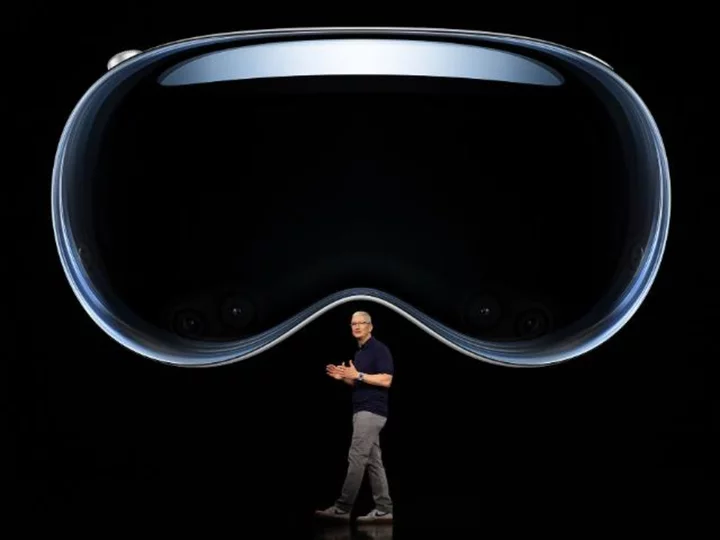When Tim Cook took over as Apple CEO from Steve Jobs nearly 12 years ago, some thought the company was already at its peak.
Under Cook, however, Apple's market cap has surged by more than 700% to nearly $3 trillion. Its iPhone business has continued to be a juggernaut, fueled by new features and pricing strategies under his watch. And Apple has built up a robust services business, including paid music, TV and gaming products, giving the company a steady revenue stream not beholden to the cyclical nature of hardware sales.
But missing from Cook's tenure at Apple has been the kind of massive, exciting product innovation seen during the Jobs years that could change how people interact with technology. Until now.
Last week, Apple introduced the Vision Pro, a mixed reality headset that the company says will usher in a new era of "spatial computing." The headset blends both virtual reality and augmented reality, a technology that overlays virtual images on live video of the real world. It's Apple's biggest, and riskiest, product launch in years.
Cook has for years extolled the promise of augmented reality, touting its potential to help people communicate and collaborate with each other. At its event last week, Cook called the headset a "revolutionary product" and "the first product you look through, not at."
But Cook is also better known as an operations mastermind than a product visionary. The two biggest product launches under Cook prior to the Vision Pro were the Apple Watch in 2015 and AirPods the following year. Those products proved to be successful moneymakers, but they didn't exactly create a new paradigm for the company or the industry in the way the iPhone did under Jobs.
The Vision Pro, which goes on sale early next year, could end up being the product that defines Cook's legacy, whether it fails or succeeds. And its success is anything but guaranteed.
Virtual and augmented reality remains a nascent market with little mainstream consumer adoption. Apple plans to charge a hefty $3,499 for its headset, which currently has limited apps and experiences, and requires users to stay tethered to a battery pack the size of an iPhone. And that's saying nothing of the challenges of convincing users to regularly wear a computer on their faces.
"The world of the headset is a real challenge ... it's proven to be a challenge to create a mass market for that," said Margaret O'Mara, tech historian and professor at the University of Washington. "The iPhone came about after many years of companies, Apple and others, trying to create a kind of supercomputer in your pocket, there was a long history of attempts. And it came on the market when a lot of people already had some sort of cellphone."
Followers of the company are divided on what the headset could ultimately mean for Cook. It's never wise to bet against Apple when it comes to hardware, but even if the company succeeds, it's probably not going to give Cook and Apple an iPhone-level success story, some say.
"It's extremely unlikely to come out with anything even close to the [success of] the iPhone," said Mike Bailey, director of research at FBB Capital Partners. "The last two opportunities — the watch was nice, the AirPods were nice, and this is probably the third thing that's just nice. There's a track record now where it's extremely difficult to show any type of massive growth that even compares to the iPhone."
But Tim Bajarin, a longtime Apple analyst and president at consumer tech research firm Creative Strategies, suggests the product shows Apple's and Cook's track record of innovation. "What Apple has done [with Vision Pro] is reinvent the personal computer," he said. "We just saw the future of computing."
"I think from Tim's standpoint, he goes at this with a mentality that says: when they come to me saying, 'It can't be done,' let's make it happen," Bajarin said.
Bajarin added that the Vision Pro reflects Cook's work to grow and improve Apple's ecosystem during his time as CEO. The headset likely wouldn't be possible without the small, powerful chips made in-house during his tenure. Apple's services bundle also makes clearer to consumers some of the ways in which they'll be able to use the device — for things like meditation or watching movies — even before the company's army of third-party developers build out additional experiences for the device, he said.
By that argument, the headset could serve as a capstone for years of product initiatives under Cook, and for his long tenure at the company.
Cook's legacy is already defined as someone who successfully created market value. With the headset, he has the chance to also be known as someone who presided over the creation of an earth-shaking new product. That would truly put him in league with Jobs.

